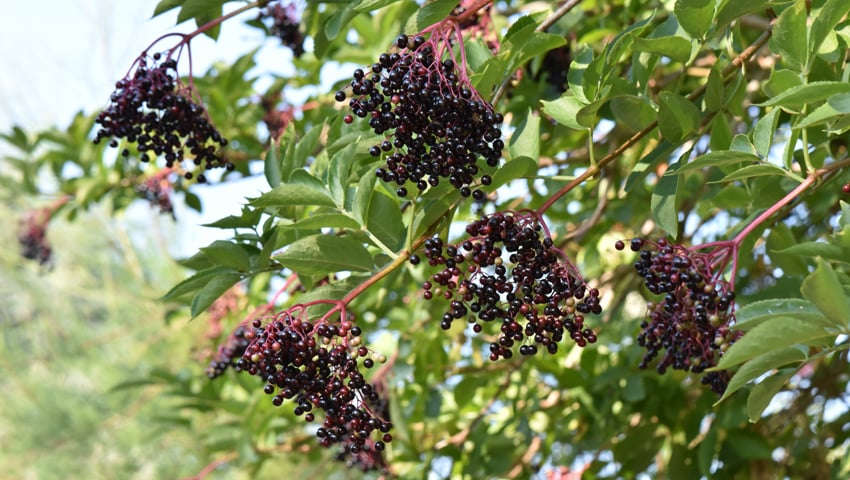Running a small business doesn’t need to be a solo project, as a group of Welsh growers discovered when they utilised a Farming Connect initiative to explore the potential of growing elder as a new income stream.
Each with land-based businesses in the west Wales countryside, many of the growers in the Agrisgôp group had known each other beforehand, but acknowledged that they needed a formal and structured approach to help them collectively move forward with a possible commercial collaboration.
Farming Connect’s fully-funded management development programme, Agrisgôp, provided that vehicle. This initiative encourages eligible farmers to get together to develop their businesses and to gain confidence and skills through action learning.
Guided by Agrisgôp leader Jacqui Banks, the group explored the potential of forming a joint venture centred on growing elderberries and other fruits.
As a growers’ co-operative, they could produce a high-value product under a joint brand, or pool their harvests to sell berries wholesale to capture the best possible price.
The group concluded that the focus should be on growing and selling berries rather than developing a product.
Agrisgôp provided a platform for meetings with expert speakers and for visits to other growers.
Some members of the group have already planted elder, including Pembrokeshire growers Lauren Simpson and Phil Moore.
On land at Parc y Dderwen, Llangolman, the couple grow seeds for the Real Seeds catalogue and for the growers’ co-operative, the Wales Seed Hub, and garlic which they plait and sell locally.
But the mainstay of their business is selling sauerkraut and kimchi, produced from their own cabbage and flavourings such as beetroot and chilli.
They saw value in adding elder to produce berries, to generate another income stream. Simpson explained, “For us, the incentive and interest of being part of Agrisgôp was to explore how we could add a bit more diversity to our smallholding.”
This was true also for commercial blueberry producers, Josh and Abi Heyneke, who farm 10 acres of land near Hebron. They have now started propagating elder with a view to adding elderberries to their future sales range.
The couple were central to the group being formed as they had been considering bringing that diversity to their business for some time. Josh Heyneke said that hearing from experts and gaining a greater understanding of the current market for elderberries had been very valuable. He said, “We are juggling many other things at the moment but we are now much better informed when we are ready to move in that direction.”
Since elder only produces flowers on second- and third-year growth, keeping trees in check stops berries from becoming hard to reach and impractical and commercially unviable to harvest. Simpson said, “A grower we visited in Somerset had trees in rows and pruning kept them all at head level so they could be managed in a way that made more sense.”
Trust was built up in the group but to move forward as a co-operative would require an injection of capital. Simpson said, “Money has been the stumbling block, to buy trees and basic processing equipment and perhaps pay for someone’s time to co-ordinate things like sales.”
But the valuable work that has already been done means the group is “ready to go” if a funding opportunity does arise.
Some growers have planted elders on a small scale, like the 20 Simpson and Moore have in the ground. Growing and propagating elder is a useful experiment along the way to perhaps something bigger, Simpson explained. She said, “We are years away from harvesting but the main thing is to get plants in the ground. If we can all do that informally while keeping an eye out for funding, when the time is right it might all come together.
“We did a lot of work around the structures and processes we would use if we were to have other members and how we would make decisions, that work is really important for working in a co-operative way, setting those foundations from the start. It does feel like we are ready to go if the opportunity arises.’’
Investing time in a diversification that may take years to generate a return is a challenge for businesses that are busy with their current enterprises. But Jacqui Banks says the group members were realistic about their goals and the long-term timeline for achieving these. “By the time the Agrisgôp group concluded they were clear that getting trees in the ground was the priority and any product development would be quite far down the line.”
